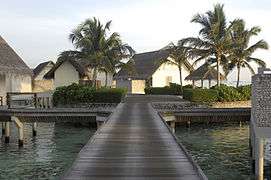Landaa Giraavaru
| Four Seasons at Landaagiraavaru (Landaa Giraavaru) | |
|---|---|
| Island resort | |
|
Landaa Giraavaru | |
| Country | Maldives |
| Administrative atoll | Baa Atoll |
| Area | |
| • Total | 0.178 km2 (0.069 sq mi) |
| Time zone | MST (UTC+05:00) |
Landaa Giraavaru, often called Four Seasons at Landaagiraavaru, is an island in the Baa Atoll in the Maldives (UNESCO World Biosphere Reserve). Sheltering a luxury Four Seasons resort since 2004, it is one of the many island resorts of the Maldives.
Geography
Localization
Landaa Giraavaru is one of the Maldive Islands, located in the northeast of Baa Atoll. Surrounded by a white sand beach and a wide coral reef, its waters are quiet and shallow, and shelter an important biodiversity.
The closest inhabited islands are Kamadhoo in the southeast and Kudarikilu in the northwest, but there are also numerous desert islands around, such as Thiladhoo, Milhaidhoo or Madhirivaadhoo in the south, which offer as many diving sites with a spectacular biodiversity.
Relief and morphology
Landaa Giraavaru is approximately 600 meters in length from east to west, and 200 meters at its maximum width ; its maximum height does not exceed 2 meters. It mostly consists of sand, which makes it a motu. The beaches that surround the island are protected by a coral reef that stretches westward, in a relatively long and little wave-cut platform made of sand and coral rubble.
Flora and fauna
Terrestrial biodiversity
The island of Landaa Giraavaru is covered with dense tropical vegetation, including in particular takamakas, coconut palm trees and screwpines. This vegetation shelters many animal species such as geckos, frigate birds, crabs, hermit crabs, dragon lizards, butterflies and dragonflies. It is also inhabited by a big ground bird, the white-breasted waterhen (Amaurornis phoenicurus), as well as by numerous giant Indian flying foxes (Pteropus giganteus). All these animals are perfectly harmless.
Marine biodiversity
The island is located inside the "Baa Atoll UNESCO Biosphere reserve" designated by the UNESCO in 2011.[1] Its shallow waters, particularly rich in coral, fish and an important population of whale sharks and manta rays have gained the atoll a reputation for exceptional diving.[1] The ecosystem is characterized by a very high cover rate coral, very diverse and dominated by several species of tabular, branching or digitate corals of the genus Acropora. In addition to a high number of pelagics, the surrounding waters shelter many large marine animals such as sea turtles, dolphins, moray eels, tuna and groupers. This atoll is also famous for welcoming important populations of spectacular big animals such as whale sharks and manta rays.[2]
Conservation
The resort shelters its own "Marine Discovery Centre" welcoming several full-time biologists, scientific divers and researchers, managed by local environmental organization Seamarc/Marine savers.[3] Particular projects of focus include the care and rehabilitation of wounded animals (turtles, cetaceans),[4] surveys of the local macrofauna (turtles, rays, whale sharks[2]) and set up an ambitious program of reimplantation of coral in damaged areas (known onsite as Reefscapers),[5] mostly funded by tourists.[6] The MDC also provides popularization course and conferences about marine life, aimed at resort guests, local islanders and marine biology apprentices.[7]
History
Probably discovered during the Prehistory at the same time as the other islands of the Maldives, Landaa Giraavaru may have been inhabited in an intermittent way because of the low availability in fresh water, even if remains of sedentary occupation were found in the northeast of the island. This population probably migrated to the close island of Kamadhoo at the beginning of the 20th century to settle the present village there. Before the opening of the hotel, the island was only punctually inhabited by one Maldivian tribe, about 10-12 people. Who exploited the coconut and certain products of the sea thanks to a regular supply from Kudarikilu there. When Resort was opened, they were offered to stay in resort for lifetime. First man died in 2007 and left his name to the restaurant of the employees, Café Umarbe.[8] Last Man died in 2014. He was also last member of tribe which occupited Landaa Giraavaru in 1900.
In November 2004, the island became home to the second Maldivian Resort of the luxury hotel management company Four Seasons,[9] and now employs approximately 500 workers and covers the entire 178062 m2 of the island, although a wide part still remains covered by a dense and semi-wild tropical vegetation
Tourism

The presence of the luxury resort Four Seasons Resort Maldives at Landaa Giraavaru makes this site one of the numerous island resorts of the Maldive, and it consists of 103 villas on the shore of the beach on stilts over the lagoon, 8 restaurants and bars, a 3-acre Spa & Ayurvedic Retreat, a PADI 5-Star IDC Dive Centre, a Marine Discovery Centre, and many leisure and entertainment facilities, as well as a fleet of boats.[9]
The access to the island from Malé and its international airport distant from about 130 kilometres is via a 35-minute seaplane flight, operated by Trans Maldivian Airways, from a seaplane platform in the Resort’s lagoon.
 One of the resort's swimming pools
One of the resort's swimming pools Water villas alley
Water villas alley Part of the pile dwellings of the spa
Part of the pile dwellings of the spa
References
- 1 2 Baa Atoll, Maldives: UNESCO World Biosphere Reserve on Visitmaldives.com.
- 1 2 "The Manta Trust". Marinesavers.com.
- ↑ "Marine Savers". Seamarc Maldives.
- ↑ "The Maldivian Sea Turtle Conservation Programme (MSTCP)". Marinesavers.com.
- ↑ "Reefscapers Story – Coral Reef Propagation". Marinesavers.com.
- ↑ Cynthia Drescher. "Why the Best Maldives Souvenir Is One You Can't Bring Home". cntraveler.com.
- ↑ "Marine Discovery Centre". Marinesavers.com.
- ↑ Sodhig (July 2014). "Meet Umarbe". Landaa Splash.
- 1 2 "Four Seasons Maldives at Landaagiravaru : Facts". Fourseasons.com/maldiveslg.
External links
Coordinates: 5°17′12″N 73°06′43″E / 05.2866°N 73.1120°E